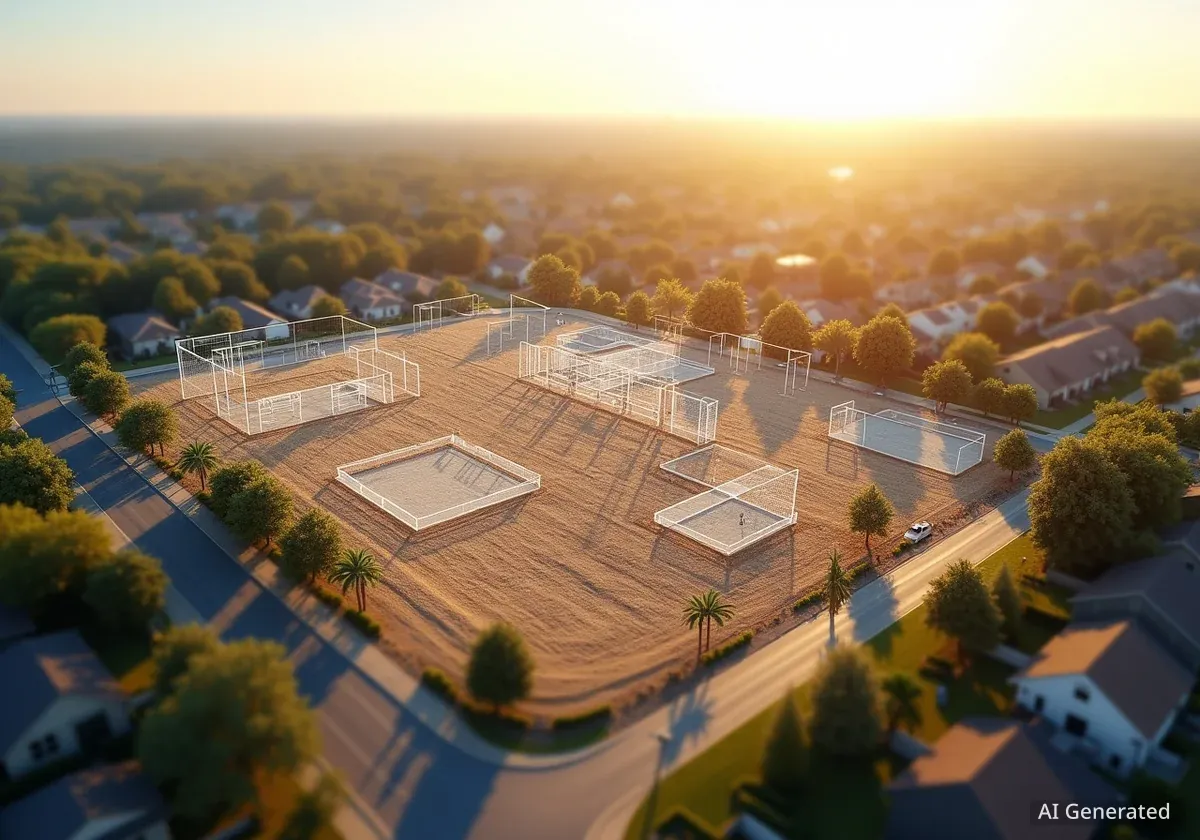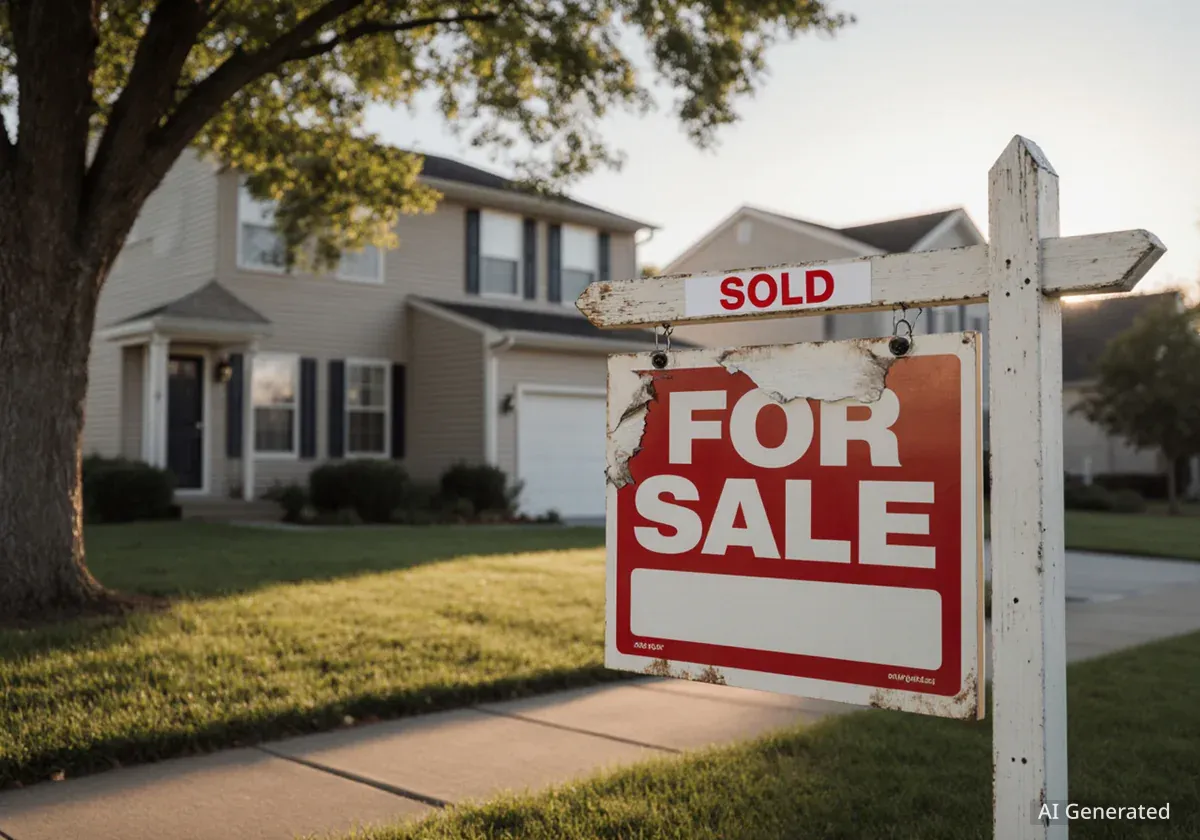A development team has proposed a $350 million investment to transform 18 acres of largely vacant land in downtown Avondale Estates. The plan, presented by Avila Real Estate and Hedgewood Homes, includes the construction of nearly 900 new homes, aiming to revitalize key areas of the DeKalb County city.
The proposal was introduced to the Avondale Estates Board of Mayor and Commissioners and outlines two interconnected mixed-use projects. If approved, the development would significantly increase the city's housing supply and connect its historic downtown with newer commercial areas.
Key Takeaways
- Project Scope: A $350 million proposal to develop 18 acres in Avondale Estates.
- Developers: A partnership between Atlanta-based Avila Real Estate and Hedgewood Homes.
- Housing Details: The plan includes nearly 800 apartments and over 100 for-sale homes, such as cottages and townhouses.
- Economic Impact: Aims to revitalize a long-vacant central property and bring new residents and customers to local businesses.
- Current Status: The project is in its preliminary phase and will require zoning changes and further city review before proceeding.
A Transformative Vision for Downtown
City officials in Avondale Estates are considering a large-scale development that could reshape two of its most significant undeveloped properties. The proposal from Avila Real Estate and Hedgewood Homes represents one of the largest single investments in the city's history, with a projected cost of $350 million.
The core objective is to address a long-standing issue: a large, vacant tract of land near the city's Tudor Revival-style downtown. This area has been described as a "dead zone," creating a physical and economic gap in the city center. The new plan seeks to fill this space with a vibrant, walkable neighborhood.
By developing these 18 acres, the city hopes to create a more cohesive downtown area. The project is designed to link the traditional core, including the recently developed Town Green, with the growing commercial corridor along College Avenue.
Detailed Look at the Proposed Development
The comprehensive plan is divided into two distinct but connected sections, each designed to integrate with the existing city fabric while adding modern housing and amenities.
Two Key Development Sites
The first site is the long-vacant property situated near the heart of Avondale's downtown. This portion of the development is planned to open directly onto the city's Town Green, creating a seamless transition between public space and the new residential area. Its central location is critical for revitalizing the city core.
The second site is located along College Avenue, which serves as a primary gateway into Avondale Estates from the west. This area has already seen a rise in mid-rise apartment construction, and the new project would continue this trend, adding density and housing options along a major thoroughfare.
Project by the Numbers
- Total Investment: $350,000,000
- Total Land Area: 18 acres
- Rental Units: Nearly 800 apartments
- For-Sale Homes: Over 100 units (cottages and townhouses)
- Total New Residences: Approximately 900
Housing Mix and Community Amenities
The proposal calls for a diverse range of housing types to cater to different needs. This includes a mix of large apartment buildings, smaller-scale cottages, and multi-story townhouses. According to the developers, this variety is intended to create a dynamic neighborhood feel.
A significant focus of the design is on walkability and green space. The plans feature pedestrian- and bicycle-friendly streets that will connect the new developments to existing city blocks. Amenities mentioned in the preliminary concepts include private gardens for residents, rooftop decks with city views, and a direct connection to the popular Stone Mountain Trail, a multi-use path that runs through the area.
Community Impact and Official Response
The project is seen by city leaders as a vital step in realizing the long-term vision for Avondale Estates. For years, officials have identified the two parcels as essential for the city's growth and connectivity.
Background on Avondale Estates
Avondale Estates, located in DeKalb County, Georgia, is known for its unique Tudor Revival architecture and small-city atmosphere. Founded in the 1920s, it has maintained its historic character while experiencing new growth. The city is one of the most sought-after residential areas in the county, making new housing development a key topic of discussion.
Mayor Jonathan Elmore expressed strong support for the preliminary concepts. He highlighted the potential for the project to create a new, lively neighborhood that would benefit the entire community.
"I look at that thing and I know it's going to work," Mayor Elmore stated, according to a report from Decaturish. "We are going to have another neighborhood back here. We are going to have new neighbors. It's going to be vibrant. It's going to bring customers to our businesses."
However, the project's housing plan has drawn some scrutiny. A spokesperson for the development team confirmed that the current proposal does not include any designated affordable housing units. While the plan offers a range of housing styles at different market-rate price points, the absence of an affordable component may become a point of discussion as the project moves forward.
Next Steps and Approval Process
City officials have emphasized that the development is still in its earliest stages. The concepts presented to the Board of Mayor and Commissioners were preliminary, intended to introduce the vision and scope of the project.
Before any construction can begin, the developers must navigate the city's formal approval process. This will involve submitting detailed site plans and architectural designs for review. A crucial step will be securing necessary zoning changes for the 18-acre site, which will require public hearings and a vote from the city commission.
The process is expected to include multiple opportunities for public input, allowing residents and local business owners to review the plans and provide feedback. The city commission will ultimately decide whether to approve the zoning changes that would allow the $350 million project to proceed.





